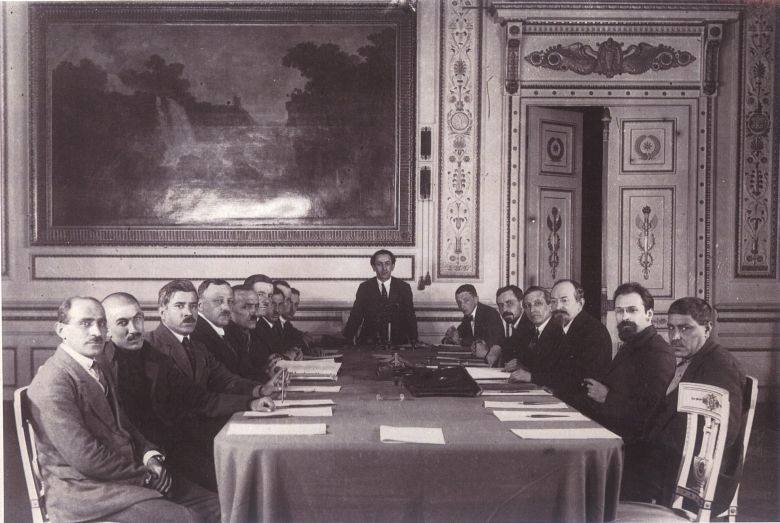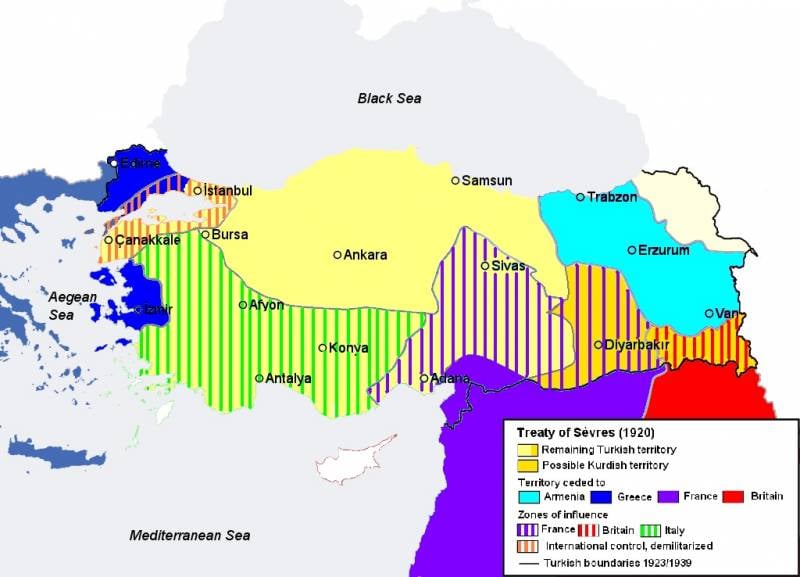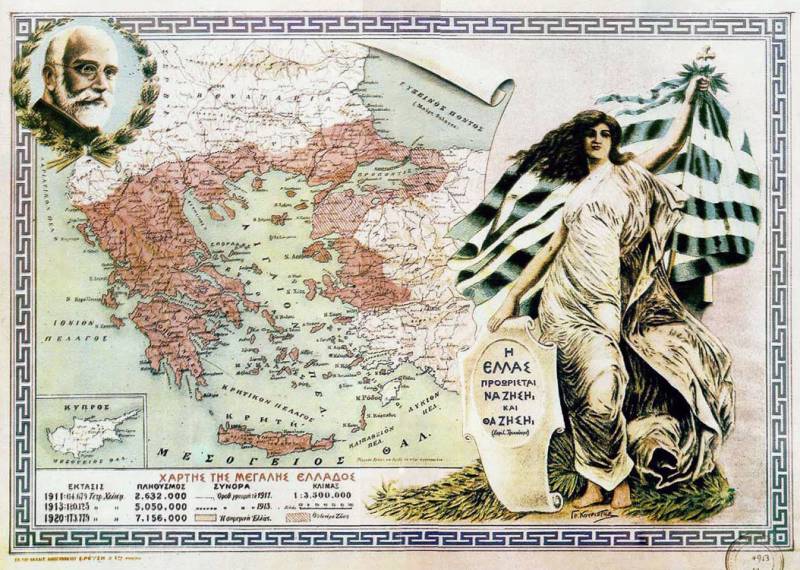How Russia helped create a new Turkey

Signing of the contract
"Raunchy" world
During the First World War, the Russian army inflicted a number of heavy defeats on the Ottoman Empire. Russian troops occupied a number of regions of Turkey, captured Erzurum (the largest administrative and military center of the eastern part of Turkey), Bitlis and Trebizond. The Russian fleet was preparing the Bosphorus operation. After the victory in Turkey, Russia was to receive Western (Turkish Armenia), completing the reunification historical Armenia, part of the lands of ancient Georgia and part of Kurdistan. The Entente formally agreed to the cession of Constantinople and the Bosporus and Dardanelles to the Russians.
However, the February Revolution crossed out all the fruits of the victories of the Russian weapons.
The Russian empire collapsed.
Trouble and intervention began. After the October Revolution, the Bolsheviks could not continue the war. There was no more army, it was necessary to restore the state.
Armistice negotiations with Turkey were conducted in Odessa. On the night of November 15-16, 1917, an armistice was concluded. This agreement literally saved Turkey from collapse in the coming days. The Ottoman Empire was completely drained by the war and Istanbul's suicidal internal politics.
True, this only delayed the collapse of the Turkish Empire, it was already inevitable.
Nationalists are becoming the leading force in the Caucasus. At the end of November 1917, the Mensheviks, Socialist-Revolutionaries, Dashnaks and Musavatists created the Transcaucasian Commissariat in Tiflis.
In fact, it was the nationalist government of the Transcaucasus (Georgia, Armenia and Azerbaijan). The Commissariat began disarming the "red" units of the Transcaucasian Front. In December, the Transcaucasian Commissariat signed an armistice with the Turks.
This did not stop Turkey.
After waiting for the complete decomposition of the Russian troops in the Caucasus, in January 1918 the Turkish army launched an offensive. Resistance was provided only by the detachments of the Armenian militias. The Turks occupied Erzincan, Bayburt, Memahatun and Erzurum. In March, Turkish troops occupied all the areas that they had lost earlier.
At the talks in Brest-Litovsk, Turkey demanded the separation of the Caucasus from Russia and the creation of an independent state there.
It is clear that such a state could exist only under the protection of Germany and Turkey.
On March 3, 1918, the "obscene" Brest Peace was concluded. Kars, Ardahan and Batum departed to Turkey.
German-Turkish intervention
German-Austrian and Turkish troops used the world for further expansion deep into the lands that were part of the Russian state.
The Bolsheviks did not have the strength and resources to resist this intervention. In April 1918, the Turks occupied Batum and Kars without a fight, in May they reached the approaches to Tiflis.
On April 22, 1918, the Transcaucasian Federation was created, which refused to recognize the Soviet power and the Brest Peace.
The federation leadership pursued a contradictory policy. One part of it (pro-Turkish, Turkic-Muslim) tried to negotiate with Turkey, rely on it. The other (Armenian nationalists) considered the Turks their enemies. Therefore, the leadership of the federation either tried to hinder the movement of the Turkish army, then entered into negotiations with the Turks.
However, the further invasion of Turkey was stopped by the Germans.
The seizure of oil, manganese and other resources by the Turks did not fit into Berlin's plans. On April 27, 1918, the Germans forced the Turks to conclude an agreement in Constantinople on the division of spheres of influence. Turkey received the southwestern part of Georgia and almost all of Armenia, Germany - the rest of the South Caucasus.
On June 8, 1918, the Transcaucasian Federation quite predictably disintegrated. Georgia, Armenia and Azerbaijan declared their independence. Turkey signed agreements "on peace and friendship" with Georgia and Armenia.
Turkey, in addition to the Kara, Ardahan and Batumi regions, received: from Georgia - Akhalkalaki district and part of Akhaltsikhe district, and from Armenia - Surmalinsky district, parts of Alexandropol, Sharur, Echmiadzin and Erivan districts.
German troops entered Georgia. Garrisons were stationed in large and important cities and ports. In total, the German military contingent in Georgia totaled up to 30 thousand bayonets. Georgian resources and transport network were brought under German control. German interventionists plundered Georgia's resources.
Azerbaijan fell into the sphere of influence of Turkey. Turkish-Azerbaijani troops (Musavatists) launched an offensive against Baku, where power belonged to the pro-Bolshevik Baku commune.
It should be noted that at that time Baku was not an Azerbaijani city ethnically (they were then called "Transcaucasian Tatars"). More than a third of the population were Russians. Armenians and Azerbaijanis had about 20% each. There were many Persians (over 11%), Jews, Georgians, Germans, etc.
The Bolsheviks did not have strong support in the city. And they could not repel the invasion of the enemy. The majority of the population of Baku did not smile at seeing the Turks on the streets of the city (the inevitability of the massacre of Christians and Armenians). Therefore, the Baku Council asked for help from the British, who were in the north of Persia.
The Bolsheviks were evacuated from the city. The power of the "Central Caspian" has been established. The British soon arrived. In early August, Turkish troops broke into the city, but local troops and the British drove them back. The Turks brought up reinforcements. And in the middle of September they took the city. A massacre was staged in Baku, in which thousands of people died. In October, the Turks captured Derbent. After the seizure of Baku, the Soviet government tore up the Brest Treaty in the part concerning Turkey.
According to the agreements of Constantinople with the Musavat government, all railways, the oil industry, the Baku-Batum oil pipeline, the merchant fleet in the Caspian Sea were transferred under Turkish rule for 5 years. The Turks plundered Azerbaijan, took out a large amount of goods and resources. A tithe was introduced for the maintenance of the occupation troops for the peasants. The peasants also supplied firewood, livestock, bread, and other products on demand, and performed household duties.
Turkish national liberation movement
The Turks did not rejoice in the victory for long.
In the fall of 1918, the British defeated them in Mesopotamia, Palestine and Syria. The Turkish government, led by Enver Pasha, resigned. The new government asked for peace.
According to the Mudross Armistice of October 30, 1918, the Turks withdrew their troops from the Caucasus.
In November 1918, the British returned to Baku. Now the Entente divided the skin of the killed Turkish bear. The strait zone, Constantinople and other important points on the territory of Turkey were occupied by the allied forces. Greece claimed Constantinople and Western Anatolia with Izmir (Smyrna). Armenian and Kurdish nationalists propose to the Entente to create an Armenian Republic, with the inclusion of the former Turkish regions and access to the Black Sea, and a Kurdish state.
In the central part of Turkey, an uprising begins against the Sultan's government, which has betrayed the country's national interests. It was headed by General Mustafa Kemal. In April 1920, the Grand National Assembly of Turkey opened in Ankara, which proclaimed itself the popularly elected supreme body of power in the country. A government headed by Kemal was formed.
There is a dual power in Turkey: two governments and two armies.
On August 10, 1920, the Sultan's government signed the Treaty of Sevres. According to it, Turkey lost its former imperial regions: they were divided by England, France and Italy. In particular, the British controlled the Arabian Peninsula, Palestine and Mesopotamia. Constantinople and the Straits zone were under international control. Only the northern and central part of Anatolia was left to the Turks, the rest of the regions were transferred to Greece, Armenia and Kurdistan. The borders of Turkey and Armenia were planned to be determined with the help of the United States.
Kemal's government refused to recognize the Treaty of Sevres, which put an end to Turkey. In such a situation, only strength could determine the future of Turkey. The Greek army landed in the west of Anatolia. The British and French did not intervene in the war, they had already taken what they wanted.
Russia returns to Transcaucasia
The Troubles showed that the Transcaucasian governments are completely unviable. They can only exist with external support.
Domestic policy has failed. The republics plunged into the most severe crisis. Local armies have low combat effectiveness. The Soviet government, having defeated the White Army in the South of Russia and in the North Caucasus, decides to return to Transcaucasia. This was due to military-strategic, political and economic reasons.
In April-May 1920, the Baku operation was carried out (Baku “Blitzkrieg” of the Red Army). The Azerbaijan SSR was created.
In June 1920, the Armenian-Turkish war began. The war was beneficial to the Entente, since the Kemalists found themselves under blows from the west (Greeks) and east. However, the opponents of the Turks miscalculated. Those showed a high level of combat capability when the future of their country was called into question. After the first small successes of the Armenian troops, the Turks launched a decisive counteroffensive. As a result, the Armenian army was completely defeated. The Turks captured all the main borders of the Armenians: Sarikamysh, Ardahan, Kars and Alexandropol. The Turkish army went to Yerevan. And there was no one to stop her (How Turkey attacked Armenia; Armenian defeat). The Armenian government called on the Entente to save them. The Entente did nothing to help Armenia. The Westernizers did not want to send their troops to Armenia.
On November 18, 1920, the Armenian government agreed to an armistice with the Kemalists. On December 2, the Dashnak government signed the Treaty of Alexandropol. The Kara region and the Surmalinsky district with Mount Ararat departed to Turkey, some areas were under Turkish protectorate before the plebiscite. The rest of Armenia, in fact, was under Turkish rule, since the Armenian army was disbanded, and its communication routes were controlled by the Turks, as well as part of its territory (Alexandropol district).
However, this treaty did not enter into force, since the Russians returned to Armenia. At the end of November 1920, local Bolsheviks revolted in Armenia. They announced the establishment of Soviet power and called for help from the Red Army. The Armenian SSR was created.
On December 4, Soviet troops entered Yerevan. The Soviet government of Armenia refused to recognize the Treaty of Alexandropol and declared it annulled.

Partition of Turkey proposed under the Treaty of Sevres. Light yellow shows the territory that was supposed to go to Turkey; dark yellow - the territory of Kurdistan, blue - the territory that went to Armenia, blue - Greece. The zones of influence of Great Britain (red), France (lilac), Italy (green) and the international demilitarized zone of the straits are shaded.
Moscow Treaty
It was a short period of "friendship" between Kemalist Turkey and Soviet Russia.
Moscow decided that the partition of Turkey was not beneficial to us. The Entente fleet in Constantinople was a threat to Russia. And the new states in Transcaucasia fell under the influence of the capitalist West. In turn, Kemal needed a quiet rear in the South Caucasus, which the Bolsheviks could provide. Also, the Bolsheviks could provide assistance to the Kemalists with money, weapons, etc. The Kemalists needed to avoid a serious war on two fronts and supplies. This is how a temporary alliance of the Bolsheviks and Turkish nationalists took shape.
The flirtation between Moscow and Ankara began in early 1920.
Kemal and his commanders believed that the Entente was using the "Eastern Front" (Caucasus) to liquidate the Turkish national liberation movement. Therefore, the Kemalists benefit from the Russians (Bolsheviks) returning to Transcaucasia, since they are now enemies of the Entente. According to the principle, the enemy of my enemy is my friend. Therefore, the Kemalists did not hinder, on the contrary, they contributed to the arrival of the Red Army in Azerbaijan.
In April 1920, Kemal asked Moscow for help in gold, weapons and ammunition. Soviet Russia provided this assistance. Ankara received gold, tens of thousands of rifles, hundreds of machine guns, dozens of guns, and a large amount of ammunition. Deliveries went by sea from Novorossiysk and Tuapse to Trabzon, Samsun and other ports, from where the cargo was transported to the interior regions of Anatolia. In the summer of 1920, Soviet troops, breaking through Zangezur, and the Kemalists occupied the Nakhichevan district, displacing the Armenian forces of the Dashnaks from it.
In Turkey itself at that time, the assistance of Russia was highly appreciated.
Kemal noted:
She helped Turkey both morally and financially.
And it would be a crime if our nation forgot about this help. "
In February 1921, the head of the Soviet delegation, People's Commissar for Foreign Affairs, Chicherin, opened the Moscow conference. On March 16, 1921, the Moscow Treaty was signed. The northern part of the Batumi region and Batum remained with Georgia (Georgia was Sovietized in February-March 1921). Alexandropol and the eastern part of the Alexandropol district remained behind Armenia. Nakhichevan district was transferred to Azerbaijan. Turkey was given Kars and Ardahan, the southern part of the Batumi region. The parties pledged not to engage in subversive activities against each other.
Article VI canceled all agreements that had been previously concluded between the two powers.
This was a major mistake of young Soviet diplomacy.
In essence, Moscow has abandoned the results of all previous victories over Turkey. And these agreements determined the borders, the regime of the straits, etc.
The most disadvantageous was Article V - the straits regime. The final international status of the Black Sea and the Straits was to be determined by the future confederation of coastal states.
In the spring of 1921, the Kemalist government was very dependent on Moscow's position in the Caucasus and the material assistance of the Bolsheviks. It was possible to resolve the issue of the straits in favor of Russia. It was a mistake to respect the interests of the coastal states - Romania and Bulgaria. These states at that time were either hostile to Russia (Romania), or under the influence of the Entente.
Thus, Moscow was able to return to the Caucasus, to restore most of the pre-war positions.
During the 1917 revolution, the state and the army were destroyed. The Caucasus, like other regions of Russia, was engulfed in turmoil. The Bolsheviks were able to return the North Caucasus, Azerbaijan, Georgia and Armenia. Of course, there were mistakes. It is also necessary to remember that in 1921 Lenin was already terminally ill, practically incapacitated. Foreign policy was carried out by Trotsky (People's Commissar for Foreign Affairs Chicherin was his protege), who was supported by Zinoviev, Kamenev, etc. There was also opposition. So, Stalin was against territorial concessions to Turkey, he believed that it was possible to do without it.
"Brotherhood" with Moscow has seriously strengthened the negotiating position of Mustafa Kemal.
In October 1921, France signed a separate agreement with Ankara. The Greek army was defeated by the Kemalists. In the fall of 1922, hostilities ceased. The Lausanne Treaty of 1923 established the borders of the new Turkey. The Turks preserved Constantinople, all of Anatolia.
This is how Russia helped create modern Turkey.

Information